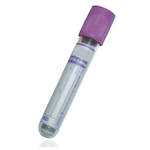Hepatitis E PCR
Patient Preparation
For taking blood samples we recommend that users follow either their local protocols or “The Royal Marsden Manual of Clinical Nursing Procedures”.
Lavender top blood (EDTA) sample
- Sufficient blood for the test should be drawn into lavender topped (EDTA) vacuum tubes
- Invert tube 8–10 times.
Red top blood (serum) samples
- Sufficient blood for the test should be drawn into red topped (no additive) vacuum tubes.
Faeces sample collection
Instructions for patient self-collection of faeces sample: PATIENT SELF COLLECTED STOOL
Instructions for faeces sample collection in hospital:
- Ask patient to defaecate into a clinically clean bedpan or receiver.
- If the patient has been incontinent: a sample may be obtained from bedlinen or pads: try to avoid contamination with urine.
- Using the integrated ‘spoon’ in the sample pot lid, scoop enough faecal material to fill a third of the specimen container (or 10–15 mL of liquid stool).
- Apply specimen container lid securely.
- Label sample and complete microbiology request form (including relevant information such as onset and duration of diarrhoea, fever or recent foreign travel).
- Dispatch sample to the laboratory as soon as possible or refrigerate at 4–8°C and dispatch within 12 hours.
Notes
Infection can result in a range of symptoms ranging from asymptomatic cases through to acute fulminant hepatitis and chronic hepatitis with fibrosis in immunocompromised hosts. Patient groups at increased risk of infection include blood transfusion recipients, the immunocompromised and pregnant women. Traditionally HEV infection has been diagnosed by serological methods; however test results can be unreliable, particularly in immunocompromised groups; therefore RT-PCR is the preferred method of diagnosis and can also be used to monitor disease progression during antiviral therapy. This commercial real-time RT-PCR assay has been validated by the manufacturer for the qualitative detection of all four HEV genotypes in plasma, serum, stool and saliva specimens. Specimens are first extracted on the Qiagen MDx. Real-time detection is performed on the ABI 7500 fast instrument using a ready for use reaction mastermix and enzyme mix targeting HEV and a multiplexed internal process control.
Reference Range
Lower limit of detection is 500 copies/ml
Specifications
- EQA Scheme?: Yes
- EQA Status: QCMD
